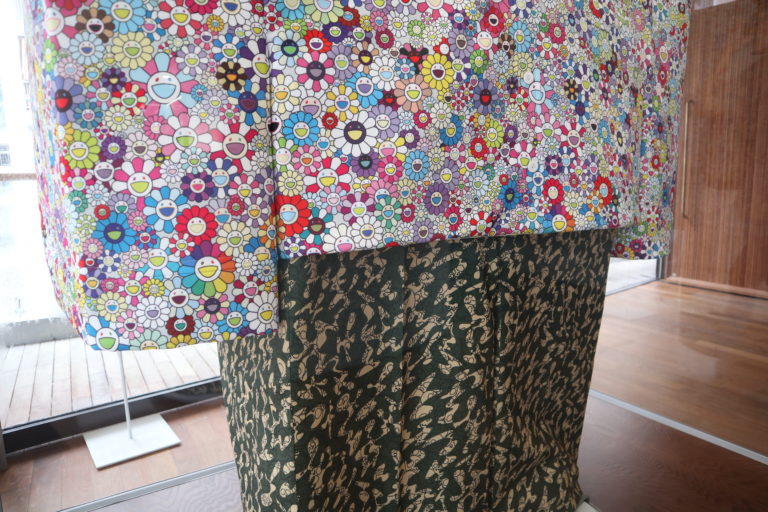Takashi Murakami was born on February 1, 1962. An International Art star and cultural icon. A Japanese contemporary artist, a founder and President of Kaikai Kiki Co. Ltd. and Geisai. He works in fine arts media, commercial media and He is known for blurring the line between high and low arts.
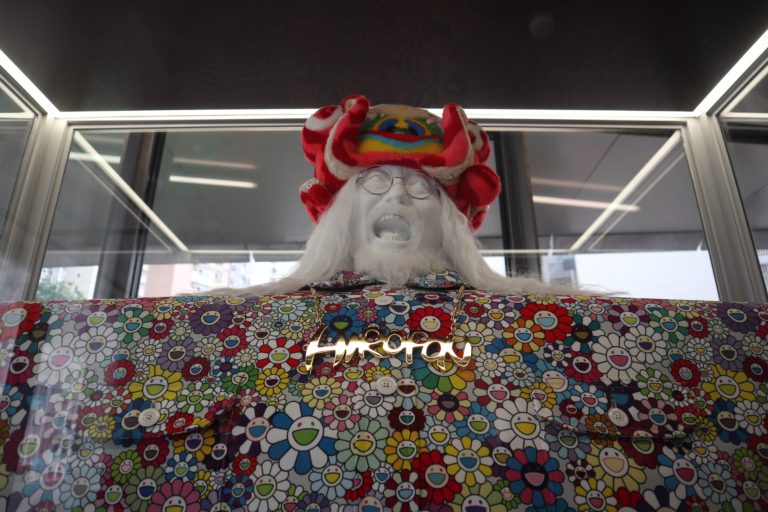
Takashi is known for his color saturated and sexually deranged anime artworks. His works are characterized by bright flower-headed figures, frenetic wild-eyed colors and what he calls a “superflat”. He is one of the most sought-after names in the art world. His arts have been sold at high-profile auctions and mass produced on Flower Key Chains, bags, mugs, and shirts at affordable prices.
Takashi Murakami’s Records
- Takashi Murakami originally wanted to be an animator. He has been a fan of Japanese animation and comics anime and manga from a very young age.
- He is a graduate of Arts at Tokyo University, majored and earned a PhD in Nihonga. – a traditional style of Japanese painting and aesthetics.
- Murakami’s early works from the 1990s were the direct result of his disgust towards the politics and elitism of the contemporary Japanese art world.
- He joined and landed a residency in a prestigious PS1 International Studio Program in New York in 1994. During this period he was influenced by Western artists like Jeff Koons and Anselm Kiefer. He began exhibiting in major Europian and North American Galleries.
- Takashi holds his own exhibits, curates others and gains commissions. He managed the twice-a-year art fair, Geisai.
- He helps manage the careers of young Japanese artists and other budding artists from around the world.
- His well-known character is Mr. DOB, Flowers, and Kaikai Kiki and Friends.
- After art and fashion, he invests himself in music and audiovisual work. His first music video was for Kanye West in 2007. In September 2014, he directs the video for Pharrell’s song “It Girl”, where the singer will have his own anime character.
- In May 2008, He became one of the most expensive living artists in the world. His sculpture My Lonesome Cow Boy (1998) is sold for more than 15 million dollars at Christie’s auction.

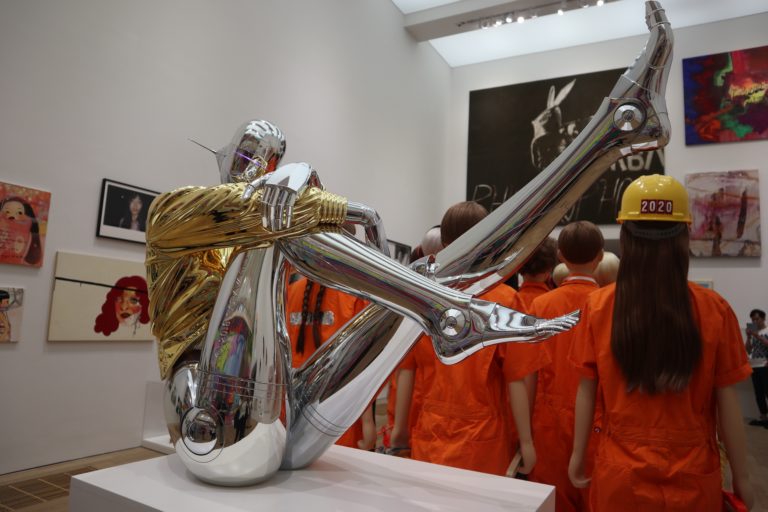
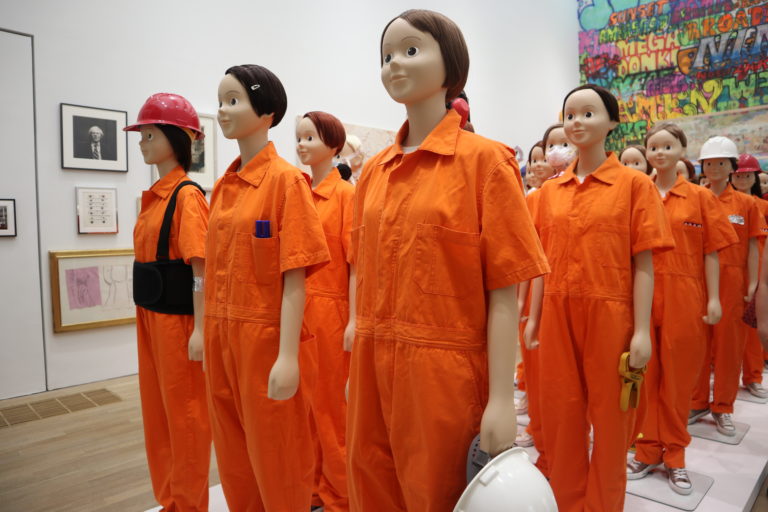
Interesting Facts about his Works
He coined the term “superflat“. It describes both the aesthetic characteristics of the Japanese artistic tradition, the nature of post-war Japanese culture and society. He use his artistic style and other Japanese artists he has influenced. The term was used for the first time in 2001 during an exhibition he organized in Tokyo, retracing the origins of Japanese contemporary art through the history of Japanese traditional art.
The SUPERFLAT…
This artistic trend includes Japanese art inspired by manga and anime. In the word “superflat“, there is the word “flat” that refers to the flatness found in Japanese pictorial art. Indeed, for centuries, Japanese art does not know of perspective and is always very two dimensional. “Superflat” also criticizes the lack of thought of consumerist Japanese post-war culture.
The theory was published in the group exhibition catalog he organized for the Los Angeles Museum of Contemporary Art. In his theory, Murakami discusses Japan’s history of two-dimensional art. The theory also details his thoughts on post-war Japan’s popular taste and the line between social classes.
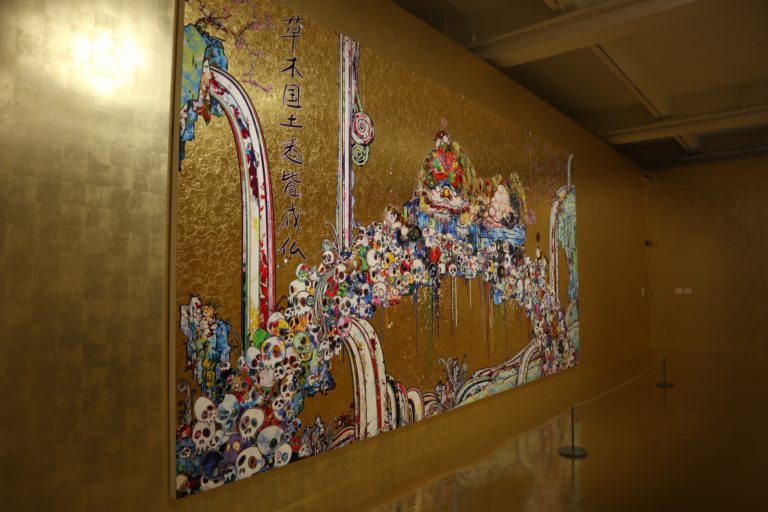
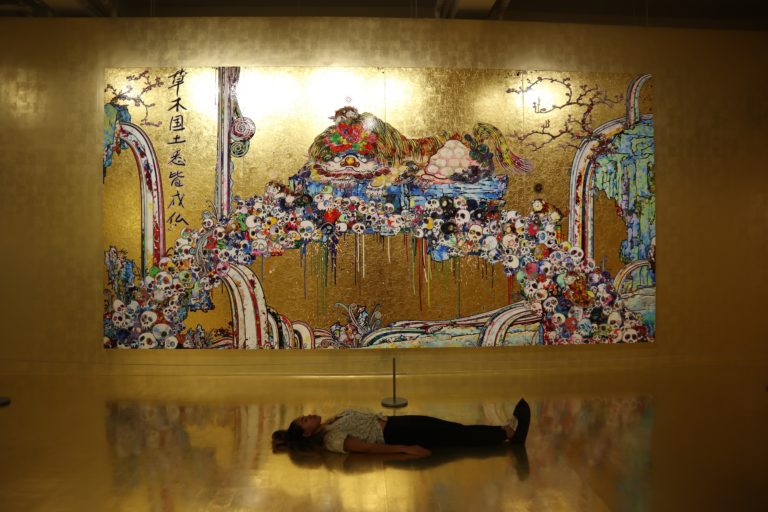
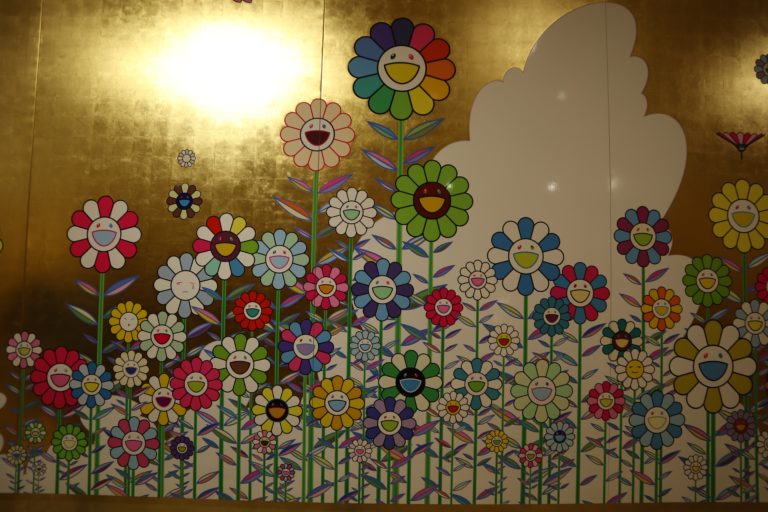
He is the founder of Kaikai Kiki Co., Ltd. Like Warhol, Murakami creates a sort of Factory, and an atelier developed into an empire. A lot like Jeff Koons factory in New York, there are places of production where hundreds of workers execute different steps of the artistic process to realize the artists’ idea. However, Murakami goes further in this approach and creates numerous merchandise like flower anime printed rugs referring to his signature motif.
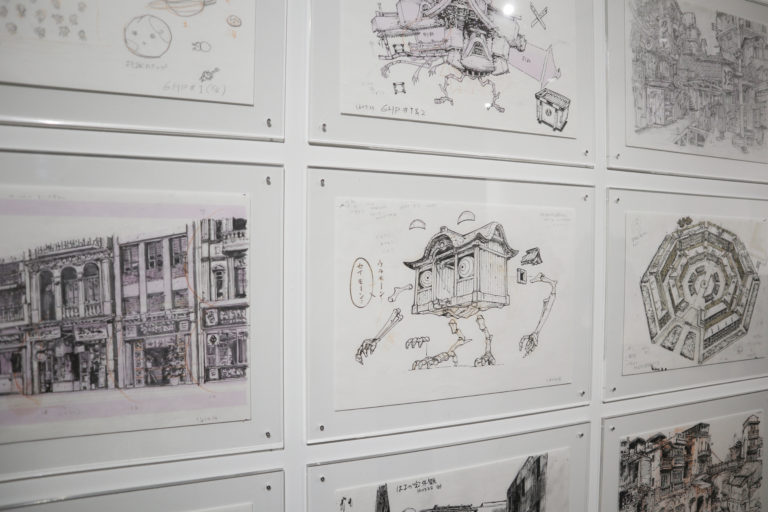

Takashi Murakami is the Andy Warhol of Japan.
Murakami’s art was based on Andy Warhol. Indeed, his two art pieces Warhol/Silver and Warhol/Gold are a direct reference to Warhol’s flower series. We find in Murakami deep respect for Warhol’s legacy but also a stunning and profound reflection for his master.
His Signature character is Mr. DOB.
The character revealed in 1992. It changes forms and colors but it’s basically a giant-eyed, grinning face with two ears, one which has the letter D, one with the letter B. The character portrays a sharp-toothed yet playful character whose name derives from the Japanese slang phrase “dobojite” or “why?”. This question reflects Murakami’s dissenting view of consumer society as lifeless and empty, he revealed to Artsy in a statement.
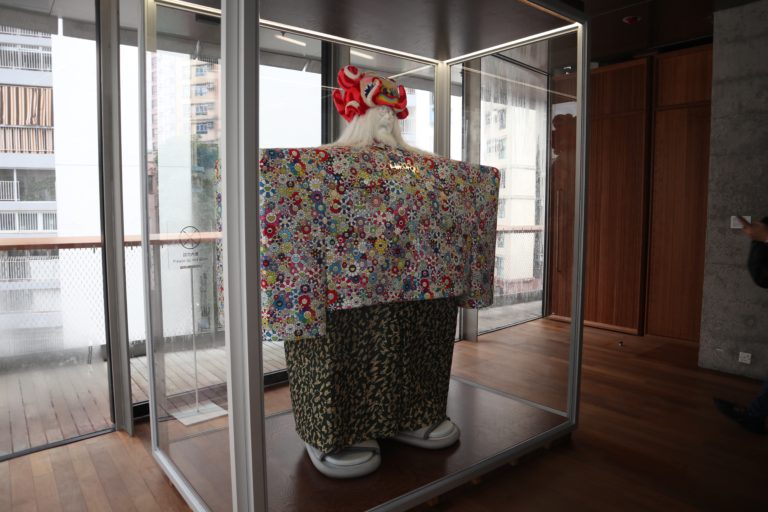
COLLABORATIONS
- Louis Vuitton X Murakami – Collaborated to reinvigorate the iconic brand. The Japanese fine artist play on the monogram design. It proved a huge success. It brought him an International acclaim and notoriety as an artist.
- Google X Murakami – Doodles is the Homepage of Google in 2001. He created it especially for the event.
- Pharrell Williams X Art Basel – In 2009 edition of Art Basel in Switzerland, the artist collaborated with Singer Pharrell Williams giving birth to the simple things
[/vc_column_text][vc_images_carousel images=”1059,1060,1061″ img_size=”full” slides_per_view=”3″ hide_pagination_control=”yes” hide_prev_next_buttons=”yes”][vc_column_text]
- Murakami X Pop Magazine – In 2010 the British magazine created a special cover composed by a mashup of designs by Murakami and images of Britney Spears.
- Vault by Vans X Murakami – After years of high-end collaborations, Murakami has given the public an affordable pieces. Vans, the original action sports footwear and apparel brand collaborated with the prolific Japanese contemporary artist.
- Murakami x Casio G-SHOCK – The Casio G-SHOCK Frogman Watch designed by Takashi Murakami for a collaborative collection, came with translucent pink color, engraved artwork and a watch pillow with one of Murakami’s signature flower.
- Takashi Murakami x ComplexCon – In 2017, Takashi served as the artistic director of Complexcon, a convention of fashion, streetwear, art, and pop culture.
Importance of Contemporary Art
- One of the biggest benefits of Contemporary Art is the aesthetic value. Art possesses some capacity to elicit a sense of pleasure in the viewer.
- Research shows that viewing art can be relaxing and inspiring. The use of mindful exercise is currently so popular. Art can pull people out of their mind and wandering thoughts into the present moment and experience what is in front of them.
Express Personal Expression…
- Art allows individuals a means of Personal Expression. Through painting, sculpture and performance art, anyone can express themselves in a way that will be observable to others.
- Art allows the artist to make commentary on the culture around them. This can include depicting literally or figuratively their views on everything. Ranging from politics to pop culture. With imagery, shapes, and other varied media, the artist can create a dialogue or narrative of their views. When the viewer engages with the piece, they engage with the artist’s.
- Art is both personally expressive, commentary on culture, and Though Provoking. This is the reason why people enjoy going to museums and spending time with art. For many, it can lead to education, information, and growth.
- Although Murakami’s work expresses an apparent psychedelic candor, he invites us to read between lines and offers a solid pictorial reflection.
[/vc_column_text][vc_images_carousel images=”1062,1063,1064″ img_size=”full” slides_per_view=”3″ hide_pagination_control=”yes” hide_prev_next_buttons=”yes”][vc_column_text]
Three levels of understanding appear to us.
- The criticism of Otaku. An extremist anime fans who inspire Takashi only superficiality and emptiness.
- He influences of society’s consumerist culture and its products in our personality and behavior.
- The artist achieves an interesting union between “high culture” and the so-called “popular” culture. A syncretism that raises the question of the legitimacy of this difference. A subject debated in the world of art today.
So, Why is Takashi Murakami important in contemporary art?
“You have seen his work, even if you don’t know who he is.” That’s pretty much how people who does know the Artist. Takashi Murakami ended up explaining to the innocent just who he is — especially in Japan, where he should be a household name, but isn’t.
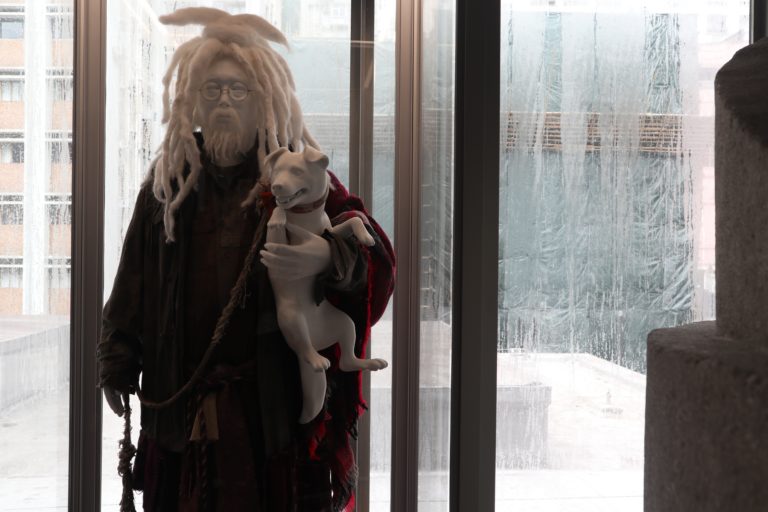
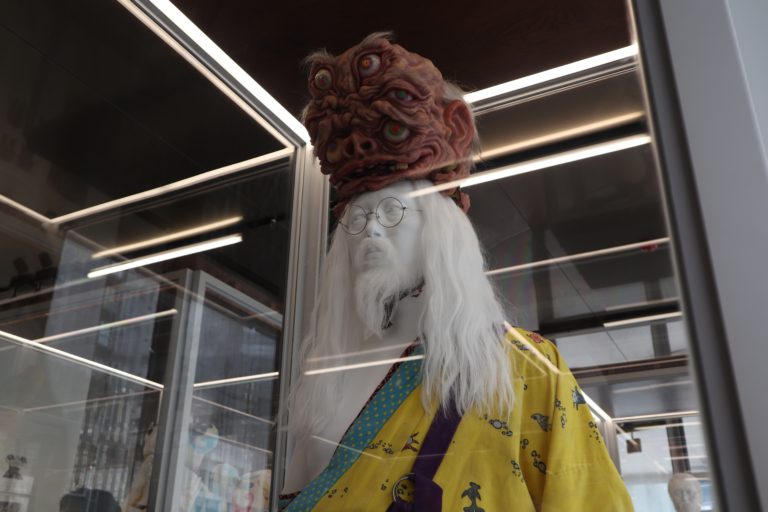
Elsewhere, his distinctive imagery adorns clothes, footwear and accessories. He has numerous tie-ups with brands like Louis Vuitton, Adidas, Uniqlo, and Frisk mints. In spite of his massive presence in the international art scene, once his work is pointed out to people in Japan, the reaction is often simply, “Oh, him! The one who does those “kawaii” (cute) flowers”. Referring to a major motif in his work.
So why is he well-known and admired abroad, but not respected in his home country? Murakami answered, Japanese might “hate” him! or at least that they don’t understand his art. To understand Murakami, one has to recognize that he really doesn’t care what Japanese people think of his art, because he is not creating it for them.
His focus has always been the international market, where his work now sells for tens of millions of dollars. And his exhibitions have thousands of fans lining up to see them. He’s a successful art collector, mentor, filmmaker, and curator. Without whom the face of contemporary Japanese art could be very different.
.
If you found this article helpful leave a comment, or just share!


